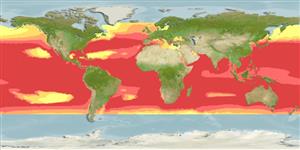Preferred temperature (Ref.
115969): 13.3 - 29, mean 26.2 (based on 8934 cells).
Phylogenetic diversity index (Ref.
82804): PD
50 = 1.0000 [Uniqueness, from 0.5 = low to 2.0 = high].
Bayesian length-weight: a=0.01072 (0.00955 - 0.01202), b=3.10 (3.07 - 3.13), in cm Total Length, based on LWR estimates for this species (Ref.
93245).
Mức dinh dưỡng (Ref.
69278): 4.4 ±0.5 se; based on diet studies.
Thích nghi nhanh (Ref.
120179): Trung bình, thời gian nhân đôi của chủng quần tối thiểu là 1.4 - 4.4 năm (K=0.3-0.5; tm=2-3; tmax=12; Fec=61,516).
Prior r = 0.52, 95% CL = 0.35 - 0.79, Based on 9 full stock assessments.
Fishing Vulnerability (Ref.
59153): Moderate vulnerability (38 of 100).
Climate Vulnerability (Ref.
125649): Moderate vulnerability (41 of 100).
